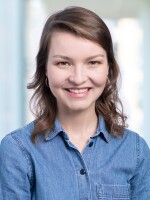AUDIE CORNISH, HOST:
In Washington, D.C., 2 in every 3 students can't read and write on grade level when they start high school. And it's a problem nationwide. Many schools rely on mentoring programs to help younger students catch up. But one program in the nation's capital is turning that idea on its head, helping older students become better readers by teaching younger kids.
Clare Lombardo of the NPR Ed team reports.
UNIDENTIFIED STUDENT: Yeah, P-O-E-O...
UNIDENTIFIED STUDENTS: No.
MIKALA TARDY: It's P-E-O.
UNIDENTIFIED STUDENT: Yes, P-E-O.
TARDY: So this doesn't go right here, so...
CLARE LOMBARDO, BYLINE: That's high school senior Mikala Tardy (ph). She's leading three second-graders through a worksheet in a classroom at Payne Elementary School, not far from Capitol Hill. The exercise is all about communities and the building blocks that create them.
UNIDENTIFIED STUDENT: P-E-O-P-L-E.
TARDY: Good. OK, so people, comma.
LOMBARDO: Twice a week, Mikala walks six blocks from Eastern Senior High School to work with the students here. It's all through Reach, a program she's been a part of since her freshman year. Reach trains high school students, like Mikala, to be tutors and work with elementary schoolers on their reading skills. Mikala says she likes reading a lot more than she did when she started almost four years ago.
TARDY: When I'm at the school, I feel like a teacher.
MARK HECKER: We work to just position them as community assets and role models. That's not often how teens, and especially teens of color, are treated in our world.
LOMBARDO: That's Mark Hecker. He's a former social worker, and he founded the nonprofit in 2009. Hecker says that most teenage tutors start the program reading between a fourth and sixth-grade level. And as these teens tutor, they become better readers, too.
HECKER: So it's a tutoring program that works in two directions.
LOMBARDO: Hecker says struggling teenage readers are often given work written for much younger students, but that doesn't work.
HECKER: They can tell they're being given what a lot of our kids would call baby work.
LOMBARDO: With Reach, teens are given the responsibility of helping a younger student. And for them, it isn't just an after-school program. It's a job. And they get paid.
HECKER: We trust teens to be responsible for things that they care about. And often, it - for them, that makes education real in a way that the classroom doesn't always.
LOMBARDO: That idea - trust - is a big one in the program. Reach is all about establishing consistent relationships. In D.C. public schools, three-quarters of students are on free or reduced-price lunch. Many face poverty and the traumas that come with it.
HECKER: And you have to be forgiving that they're not going to be perfect because they're navigating many, many things in their personal lives.
LOMBARDO: The goal is to get these tutors reading at a 12th grade level and ready for college and work by the time they graduate. In the end, Hecker says, Reach is about growth and long-term learning.
HECKER: I don't need to win the afternoon in February of 2019. I want to be proud of that young person when they're 22 years old.
TARDY: It is a tutoring program, but it's also a program to help you grow.
LOMBARDO: Mikala Tardy is on track to graduate, and she plans to head to college. After that, there is one thing she knows for certain - she wants to work with kids. Clare Lombardo, NPR News. Transcript provided by NPR, Copyright NPR.




